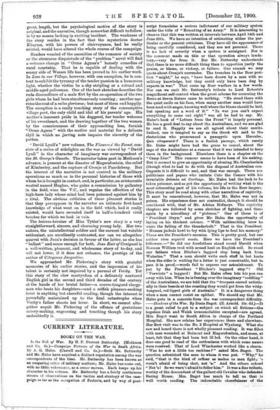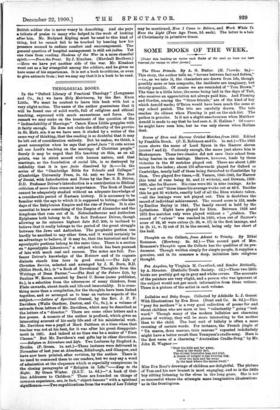C URRENT LITERATURE.
BOOKS ON THE WAR.
In the Web of War. By H. F. Prevost Batteraby. (Methuen and Co. 681—Campaign Pictures of the War in South Africa. By A. G. Hales. (Cassell and Co. 6s.)—Both Mr. Battersby and Mr. Hales have acquired a distinct reputation among the war correspondents of the time. Mr. Battersby has been known as an unsparing critic of military matters; Mr. Hales has come out, with no little vehemence, as a censor morum. Each keeps up his character in his volume. Mr. Battersby has a fairly continuous stream of observations on the tactics and strategy of the cam- paign as far as the occupation of Pretoria, and by way of post- script formulates a serious indictment of our military system under the title of "Remaking of an Army." It is interesting to observe that this was written at intervals between April 14th and June 28th. We have no intention of estimating either the par- ticular or the general criticisms. They have all the appearance of being carefully considered, and they are not personal. There is no lack of severity when a system is arraigned. Nor is the comment made on this or that operation always lauda- tory,—very far from it. But Mr. Battersby understands that there is no more difficult thing than to apportion justly the praise, or blame, or victory, or failure. One remark we may quote about Cronje's surrender. The trenches in the Boer posi- tion "might," he says, "have been drawn by a man with no military knowledge, but they could only have been dug by experts in war." That sums up Boer warfare in a few words. Nor can we omit Mr. Battersby's tribute to Lord Roberts's magnificent self-control when the great scheme for cornering the Boers at Seven Sisters came to nothing. "He stood there with the quiet smile on his face, when many another man would have been mad with anger, knowing well where the blame should be laid, but speaking not a word of it." " In war you can't expect everything to come out right" was all be had to say. Mr. Hales's book of " Letters from the Front " is largely personal. He has a good deal to say about the Australians, and we are glad to read it. Happily we are all agreed about their merits. Indeed, one is tempted to say as the Greek wit said to the rhetorician who pronounced a panegyric upon Hercules, Quis vituperavit ? There is a foolish passage, which surely Mr. Hales might have had the grace to cancel, about the rage of the Australians at a rumour that it was intended to keep them in the background. Elsewhere there is a chapter on the "Camp Liar." This rumour seems to have been of his making. But it seemed to give an opportunity of abusing Mr. Chamberlain (though what he had to do with the disposal of Australian con- tingents it is difficult to see), and that was enough. There are politicians and papers who imitate Cato the Censor with his invariable .Delenda est Carthago. Mr. Hales had the luck to be taken prisoner, and so got the opportunity of writing what is the most interesting part of his volume, his life in the Boer laagers. This story must be read along with other narratives of captivity. It must be remembered, however, that Mr. Hales was not in prison. His experience does not contradict, though it should be considered with, that of Mr. Adrian Hofmeyr. The captivity chapters are followed by some sketches of fighting, and these again by a miscellany of " pictures." One of these is of " President Steyn," and gives Mr. Hales the opportunity of laying on his thickest colours. " With unblenching brow he waits the falling of the thunderbolt." That is the President. " Human jackals howl to try with lying lips to foul his memory." These are the President's enemies. This is pretty good, but our author sires acguirit eundo. Here we have the President's followers :—" So did our forefathers stand round Harold when Norman William trod with armed heel on English soil. So stood our fathers when Blucher's laggard step hung back from Waterloo." That a man should write such staff in hot haste when the rider is waiting for a letter is just conceivable, but to pass it in proof,—words fail to express our astonishment. To put by the President " Blucher's laggard step " ! Old " Vorwarts " a laggard But Mr. Hales often lets his pen run away with him. When he is fuming over the imaginary "coddling " of the Australians, we are told that the " troopers cursed artistic- ally in their beards at the restating they would get from the witty. tongued, red-lipped girls of Australia." It is a dangerous thing when a man cannot resist an epithet. We should say that Mr. Hales puts in a concrete form the war correspondent difficulty. —Shadows of the War. By Dosia Bagot. (E. Arnold. 10s. 6d.)—It is a great relief to get to a subject on which all Britons—the hopeless Irish and Welsh irreconcilables excepted—are agreed. Mrs. Begot went to South Africa in charge of the Portland Hospital. She now relates her experiences there and elsewhere. Her first visit was to the No. 2 Hospital at Wynberg. What she saw and heard there is not wholly pleasant reading. It was filled with men wounded at Belmont and Magersfontein, and some, at least, felt that they had been but ill led. On the other hand, it does one good to read of the enthusiasm with which some names were received. That of Lord Winchester worked like a charm. " Was he not a little too reckless ? " asked Mrs. Begot. The question astonished the man to whom it was put. " Why," he said, "that is the kind of orficer as makes us men fight; 'e warn't afraid of being shot, not 'e." And the others echoed "Not 'e ! So we warn't afraid to foller him." It was a fine tribute, worthy of the descendant of the gallant old Cavalier who defended Basing House. Mrs. Bagot has much to tell us that is well worth reading. The indomitable cheerfulness of the British soldier she is never weary in describing. And she pays a tribute of praise to many who helped in the work of looking after him. Mr. Rudyard Kipling must be used to this kind of thing, but he cannot fail to be touched by hearing how his presence seemed to radiate comfort and encouragement. The general question of hospital management is still sub judice. Yet one rises from reading Shadows of the War in a more cheerful spirit.—From the Front. By J. Kinahan. (Marshall Brothers.) —Here we have yet another side of the war. Mr. Kinahan went out as a lay evangelist among the soldiers, and he gives us here some of his experiences. It is not a book to criticise, or even to give extracts from ; but we may say that it is a book to be read.







































 Previous page
Previous page